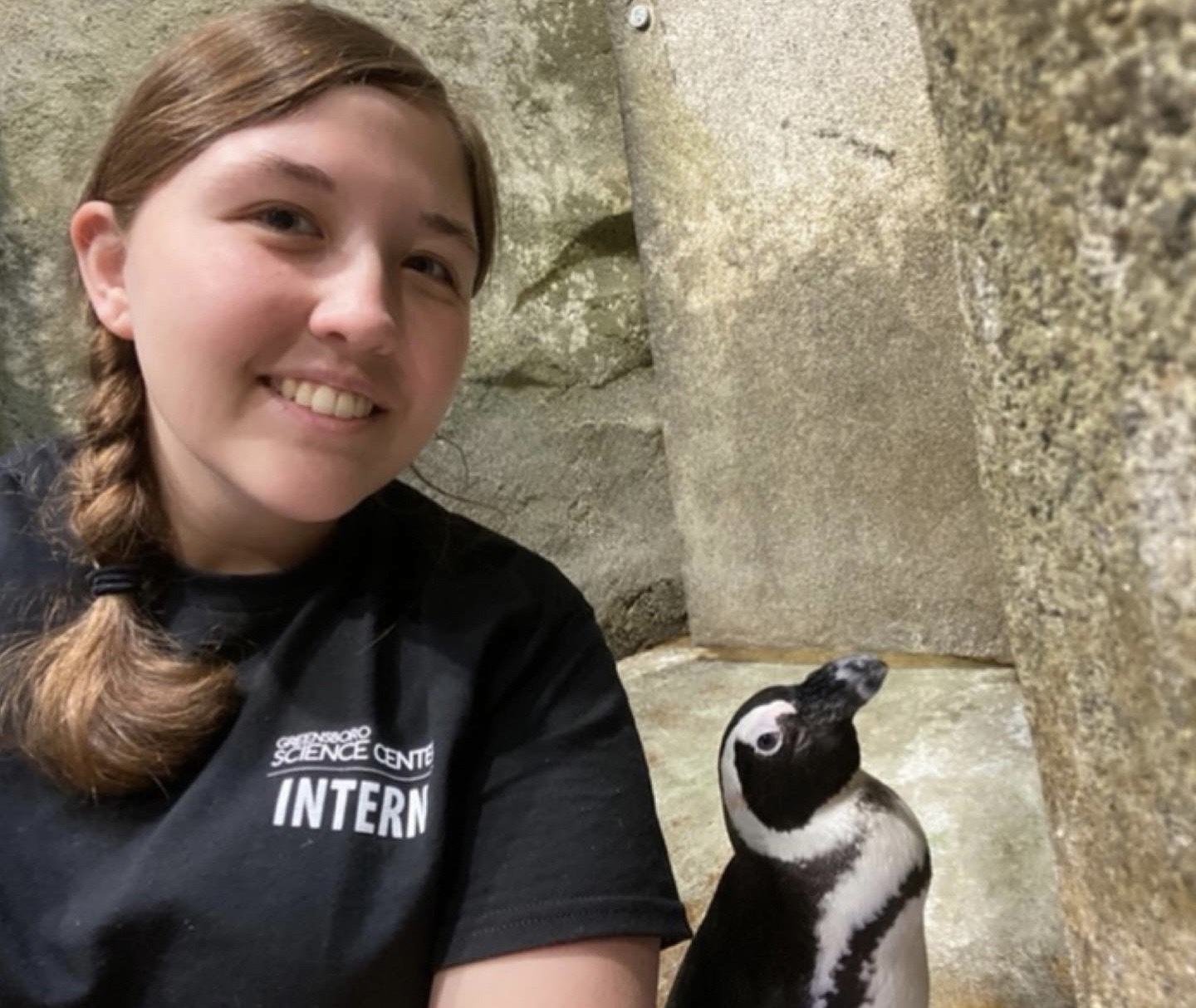Hannah Damewood '23, Zoo and Wildlife Biology
Hannah Damewood ‘23, a Zoo and Wildlife Biology major with minors in Marine Biology and Psychology, always knew she would be working with animals. 
“Working with animals has been my lifelong desire,” said Damewood. “I wanted to be a vet when I was young, but then I realized the medical knowledge I would have to learn and rethought that to end up where I am now.”
Her desire led her to Malone, a school that she knew from the start was the place for her.
“I chose Malone because I felt called to come here when I visited. I visited the Zoo and God just told me it was where I needed to be. My parents realized it immediately too. I was so excited to get to work hands-on with all these animals,” she said. “The live animal collection at Malone is unique. I realized as I searched that a lot of similar-size colleges don’t have hands-on husbandry programs.”
When combined with her hands-on experiences, Damewood’s combination of majors positions her well for a future working with both animals and the public.
“I only needed two classes to minor in Marine Biology, and I also really like psychology. I think it's interesting to learn about people and their interactions with the world,” she said. “I have taken classes that have dealt with people and animals, so I am better at public relations and understanding people, and I’ve learned how animals act and react to different things and how to best train them.”
As she prepared to enter into her senior year, Damewood landed an internship with the Greensboro Science Center in Greensboro, North Carolina.
“I was an aquarist intern under one aquarist named Katie and her coverage strings, which is her group of tanks that she was in charge of. She’s the cold water aquarist, so I worked with a giant pacific octopus, seahorses, a peacock wolf-eel, a lot of invertebrates, indo-pacific saltwater fish that were really big and colorful, and stingrays,” said Damewood.
Her day-to-day duties included cleaning and serving tanks, preparing the diets for a variety of animals, and assisting in various forms of enrichment for the physical and mental health of the animals.
“Most people don’t think about enrichment because they’re ‘just fish’, but we used the same enrichment items that we would use for mammals and did a lot of food motivated enrichment,” said Damewood. “We stuck greenery in balls and the fish would come interact with them. We placed gel clings on the outside of the tanks which they'll mess with because they think it's food, and they got a lot of joy chasing laser pointers.”
Damewood found that providing enrichment for an octopus was a whole different ocean.
“Octopuses are more complicated because they need to be constantly stimulated, so their enrichment is centered on puzzles,” she said. “We would put food in a peanut butter jar and they would have to unscrew the lid, or we could put food inside a Mr. Potato Head and then the they had to figure out how to retrieve it. The guests were able to watch all this and that was super fun because they could see the different species immediately interact with their enrichment objects.”
In addition to all the fun, Damewood participated in valuable research that will further benefit the Center’s future animals.
“I did a research project on coccidia, which are small, parasitic single cell organisms, and giant pacific octopuses (GPO). We had a GPO when I arrived that had coccidia and it was going through her body really fast,” said Damewood. “She was also in a stage of life called senescence, which is her last stage of life before she passes, so this coccidia that she had was making it worse on her. We had to humanely euthanize her, but I did a project on the coccidia that was taking over her. We found out it came from crustaceans that she would eat, so now they’re watching what they’re feeding her because of my project.”
Whether it was life-improving research or mind-stimulating fun, Damewood says her time and classwork at Malone prepared her well to excel in these scenarios.
“Cleaning tanks was easy because I learned that so well here. Interacting with the public was easy too because of my Malone communications class. I had a really good baseline for animal care going in because of what I learned in my classes,” she said. “I was also able to infer and figure out processes, such as water chemistry, that I haven’t necessarily had a class in yet.”
Damewood hopes to continue working in Marine Biology, both for her love of the subject and for the crucial work of education and awareness.
“People typically don’t want to work with fish. They want to work with whales and dolphins, but I like the more underrepresented animals. Sometimes people don’t think fish are smart and that’s just not true,” she said. “I really enjoyed the atmosphere of working with a team. I’m still close to my Greensboro team, and I wouldn’t want to be working alone. I really like the idea of doing more training with animals, like I did with the peacock wolf eel and stingrays.”
Given the right circumstances, Damewood even hopes to return to Greensboro.
“It was really hard to leave my internship because I loved it so much. I think it's a real possibility that I’ll end up back in Greensboro after I graduate. I like it when I’m consistently working with an animal and seeing them benefit from that long term.”
